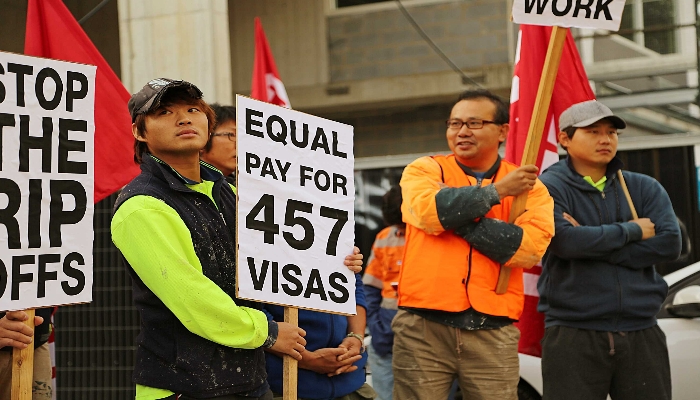
At the bottom of the heap: 457 visa workers on the NBN
Recent press reports have shed further light on what the challenging economics of the NBN project mean for many of those actually involved in the network’s construction.
Workers on temporary migration visas (457s) have been employed on the project more or less from its inception, with such workers being used on at least some of the initial “first release” sites as early as 2010. The use of such workers is now widespread, especially among the middle order contractors working for the prime contractors such as Visionstream.
The most recent revelations of the ill-treatment of 457 workers concern Q Fibre, a sub-contractor to Visionstream on the Tasmanian NBN roll-out and directly to nbn in the Northern Territory. The company also performs NBN work in Queensland and parts of NSW.
In the Tasmanian case, Q Fibre 457 workers were initially denied their proper entitlements after Visionstream terminated the company’s contract a few weeks ago. The CEPU has been pursuing the case to ensure leave and other entitlements are paid in full.
In the Northern Territory, Q Fibre 457 visa workers were told it was their responsibility to renew their visas – at their own expense. They were reportedly also told to use a particular immigration agent for the process.
The fees involved run to several thousand dollars and there are suggestions that the agent implied that if these were not paid promptly the workers’ jobs would be at risk.
The CWU considers that expenses such as visa renewal fees should be paid by the employer/sponsor who is the chief beneficiary of the 457 visa scheme. But this case also raises once again the question of the role of immigration agents in the whole scheme – a question that has also arisen in relation to temporary entrants coming to Australia on student visas.
But the larger issue is where ultimate responsibility for the conduct of the whole NBN roll-out lies. As long as the buck continues to be passed backwards and forwards between those involved in the various layers of the contracting pyramid, abuses of those at the bottom will continue.
This is a Commonwealth project and the federal government should be ensuring that employment practices at all levels of it comply with national standards. To date, however, no government has shown itself willing to accept this responsibility.










